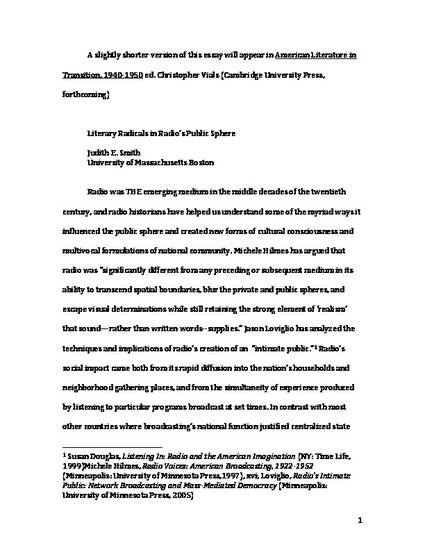
Radio was THE emerging medium in the middle decades of the twentieth century, and radio historians have helped us understand some of the myriad ways it influenced the public sphere and created new forms of cultural consciousness and multivocal formulations of national community. Michele Hilmes has argued that radio was “significantly different from any preceding or subsequent medium in its ability to transcend spatial boundaries, blur the private and public spheres, and escape visual determinations while still retaining the strong element of ‘realism’ that sound—rather than written words--supplies.” Jason Loviglio has analyzed the techniques and implications of radio’s creation of an “intimate public.” Radio’s social impact came both from its rapid diffusion into the nation’s households and neighborhood gathering places, and from the simultaneity of experience produced by listening to particular programs broadcast at set times. In contrast with most other countries where broadcasting’s national function justified centralized state control, U.S. radio developed through private ownership, with the result that consumer choice among commercial options dominated the definition of “public interest.” Despite regulatory norms, radio’s promise of immediacy and projection of intimacy made it difficult in practice to fully police the boundaries between commercial, entertainment, and political content.
This essay will explore the pathways by which some 1930s and 1940s left-wing writers gravitated to radio, and helped to expand the form, content, and the political possibilities of radio’s public sphere, beyond the constraints of its conventional commercial formulas and supposed prohibition on political messages. Especially after 1935, flourishing theatrical innovation and burgeoning social protest movements encouraged literary radicals to expand their imagination of the political and to experiment with new forms of representation.
Available at: http://works.bepress.com/judith_smith/7/

A slightly shorter version of this essay will appear in American Literature in Transition, 1940-1950, ed. Christopher Vials (Cambridge University Press, forthcoming).